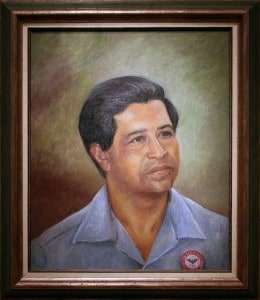As the son of parents who lived and worked as farm workers, March 31 has always been very important – and not just because we would get the day off of school. This is the day we remember Cesar Chavez and the work that he did in organizing for the rights of farm workers. It’s a reminder of the fact that the work that Chavez did directly impacted the quality of life of my grandparents, aunts and uncles, and my own parents while they were working in the fields.
The March 31 commemoration has recently gained more attention with the release of the movie Cesar Chavez, starring Michael Peña as Chavez. The film is a biopic about Chavez’s life and shows his journey when starting the United Farm Workers union along with Dolores Huerta and Larry Itliong, played by Rosario Dawson and Darion Basco. The film chronicles the grape boycott that the UFW organized to fight for farmworkers rights and fair wages. It shows the challenges that Cesar Chavez faces in choosing to commit his life to the cause of the farmworkers, giving a glimpse into the weight the family beared in accompanying him, in particular the difficulty of maintaining a non-violent stance in the face of physical aggression against his son, when Chavez held a 25-day fast until all the members of the UFW committed to signing a pledge of nonviolence.
Cesar Chavez was a catalyst for change during his lifetime, and the movie does a great job at demonstrating how he was able to achieve that change, but this movie is more than just an entertaining escape. The filmmakers created a campaign in conjunction with the film’s release to have March 31 recognized as a national day of service. In the way that Chavez was a catalyst for change in the past – the film’s tagline is “History is made one step at a time” – we can continue his legacy by being catalysts for change in the present.
The question I have after seeing the movie is “Where are we today?” Cesar Chavez fought for the rights of farm workers, like my parents and grandparents, yet it seems that the work is far from over. In many places in the US there is still a huge discrepancy between workers and the dignity and rights that they deserve, particularly for undocumented immigrants. For example, language difficulties often prevent undocumented immigrants from being aware of their rights under the law and of specific hazards in their work. Immigrant workers who are undocumented, as many are, risk deportation if they seek to organize and to improve conditions. And many immigrant farmworker women and girls reported incidents of humiliating, debilitating harassment in the form of unwanted touching, pressure to engage in sexual relations, and verbal harassment.
The UFW and similar organizations like the Coalition of Immokalee Workers are continuing to fight for farmworkers’ rights, taking on big corporations like Wal Mart and Publix, just like Cesar Chavez did. The work for the dignity and rights of workers is still as important today as it was when Cesar Chavez was working for social change. My hope is that in watching this movie and learning more about the life of Cesar Chavez, others might feel inspired to be the catalysts for change in their own communities, to be a voice for the voiceless, and shout for justice crying, “¡Sí, se puede!” My hope is that we might take to heart the words of Cesar Chavez:
We cannot seek achievement for ourselves and forget about progress and prosperity for our community… Our ambitions must be broad enough to include the aspirations and needs of others, for their sakes and for our own.
******
Cesar Chavez portrait image courtesy Flickr user Cliff, found here.
